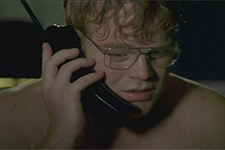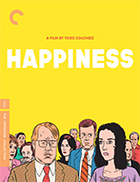Happiness (4K UHD)
|  Actor Dylan Baker tells an anecdote about how he learned the title of Todd Solondz’s acerbic black comedy Happiness, in which he plays a psychologist and suburban dad who is also a secret pedophile and serial rapist. Having only known the film as “Untitled Todd Solondz” during the entirety of production, postproduction, and early marketing, Baker learned the ironic title when he first saw the poster as he was walking into an interview about the film. “That’s the title?” he remembered wondering, at first thinking that it was a horrible mistake, and only later realizing what a perfect moniker it was for a film that is so full of misery, heartbreak, confusion, awkwardness, and perversion. A fitting follow-up to Solondz’s blistering feature debut Welcome to the Dollhouse (1996), which presented life in junior high school as a veritable hell on earth, Happiness delves into the darkest depths of various adult miseries, some of which are obvious and others of which have to be revealed. While Solondz is often derided as a misanthrope who uses the cinemas as a platform to air his grievances and revel in the worst kinds of human perversions, he is a tricky artist who often shows you one thing, but tells you something else. Happiness, like all of his films, is caustic to the point of being difficult to watch, but it is also undeniably infused with a sense of shared humanity and empathy for its characters, all of whom are struggling with their own demons. Solondz can be fairly accused of pushing things too far at times, and it is hard not to get the sense that he just wants to see what he can get away with (hence the film’s initial NC-17 rating, which the distributor surrendered in order to release it unrated). At the same time, though, his stories are engaging and his characters are so well written and fully realized by the actors who committed to them that we can’t help but feel for them. Solondz’s greatest gift as an artist is his ability to make us struggle. A lesser filmmaker (like, for example, Harmony Korine, who similarly mines human misery and perversion) would simply repulse us. Solondz, on the other hand, challenges us, which is precisely why he has described Happiness as “not a film for everyone.” Subtle, but true. As he would go on to do in most of his subsequent films, Happiness is an ensemble piece that follows the sometimes intersecting lives of a large group of people who, in this case, live in New Jersey (not exactly Chekhovian territory, but the shoe still fits). The primary connection is family, as three of the primary characters are sisters: Joy (Jane Adams), a sad-sack would-be musician who can’t quite ever seem to get it together; Trish (Cynthia Stevenson), a privileged suburban housewife and mom who unironically declares that she “has it all”; and Helen (Lara Flynn Boyle), a poet and recent literary sensation who is all steely cool on her exterior, but inside burns with insecurity and doubt about her own artistry. In the film’s brutally awkward opening scene, Joy has just broken up with her even more sad-sack boyfriend (Jon Lovitz), although her taste in men only deteriorates as she becomes involved with Vlad (Jared Harris), a Russian immigrant who is taking a citizenship class she decided to teach in a futile effort to make a “difference.” Trish, meanwhile, may believe that she has it all, but she is married to Dylan Baker’s aforementioned character, Bill, who looks completely innocuous, but is actually a pedophilic monster who preys on the friends of his adolescent son Billy (Rufus Read), who is struggling his way through the confusions of middle school. Helen, meanwhile, is unaware that she is lusted after by Allen (Philip Seymour Hoffman), her downtrodden neighbor whose only sexual outlet is making obscene phone calls. Allen, on the other hand, is desired by Kristina (Camryn Manheim), an overweight neighbor who stops by on occasion with lurid news about the doorman’s brutal demise (the true story of which offers the film’s most shocking and—dare I say it?—hilarious revelation). And, just in case we might think that all the misery is limited to characters in the prime of their lives, we also get Joy, Trish, and Helen’s parents, Lenny (Ben Gazzara) and Mona (Louise Lasser), who live in Florida and are in the midst of a separation because Lenny has simply decided that he doesn’t want to live with her anymore. Lenny, in this respect, is the true outlier in Happiness because, despite being self-centered and arguably cruel in his desire to pursue his own path alone, he is at least honest. When he gives into a sexual fling with one of his obnoxious neighbors, he responds to her breathy admonition that he not feel guilty with the fact that he doesn’t feel guilty because he doesn’t feel anything. All of the other characters feel things—lots of things, many of which are not good—and they all try to hide them away, pretending to be “normal” while secretly harboring unhealthy desires, violent tendencies, or perverse worldviews (one of the scenes that has always felt a bit out of place and has not aged particularly well involves Bill imagining himself shooting random people in a sunny park). There are moments of self-revelation—at one point Bill tells Trish while she is half-asleep that he is “sick,” and she mumbles something about taking aspirin, and Kristina eventually comes clean with Allen about the true nature of the doorman’s death. In the film’s most emotionally lacerating scene, Bill, confronted by his son after he has been outed as a rapist, answers his son’s tearful questions with brute honesty. Yet, for the most part the characters repress who they really are, putting on a thin armor of everyday tedium to hide from those around them, which is the most frightening aspect of Solondz’s view of the world. Through his lens, we see how the misfits, perverts, freaks, and psychos are not somehow separated from the rest of us, but are us. It’s a bitter pill to swallow and one that Solondz arguably makes bigger than it needs to be, but it is difficult to deny the fundamental truths he is getting at. These truths aren’t pretty—in fact, they’re quite unsettling and disturbing—but they demand some kind of attention, which is often what art does best.
Copyright © 2024 James Kendrick Thoughts? E-mail James Kendrick All images copyright © The Criterion Collection | |||||||||||||||||||||||||||||
Overall Rating: 


 (3.5)
(3.5)


